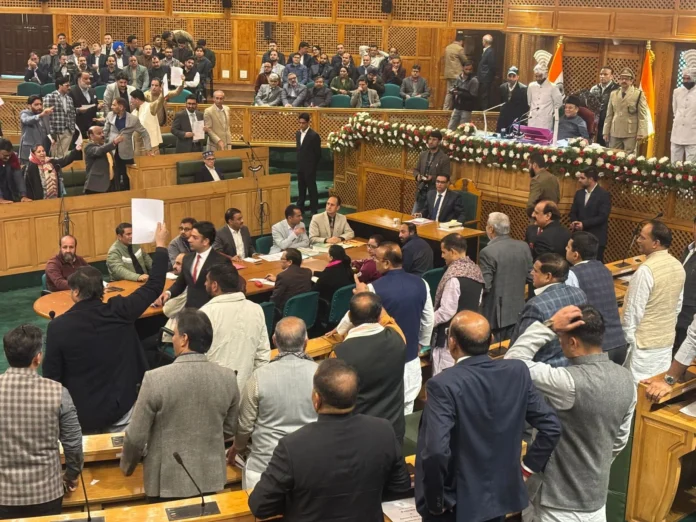Introduction
A new legislative proposal in Jammu and Kashmir seeks to provide long-overdue security to thousands of families residing on state-owned and common lands. The Jammu and Kashmir Property Rights Bill (Regularisation and Recognition of Property Rights of Residents in Public Land), 2025, introduced in the Assembly, aims to grant property rights to long-time occupants, ensuring their right to shelter and reducing the fear of eviction. If passed, the legislation will mark a significant shift in housing policies, addressing longstanding disputes over land ownership.
The Need for Legal Protection
For decades, many residents of Jammu and Kashmir have built and lived in homes on state land. However, recent eviction drives have created uncertainty and anxiety among locals, particularly in certain areas. According to lawmakers, these actions have disproportionately affected specific communities, intensifying concerns over forced displacement. Critics argue that large-scale land retrievals have put thousands of families at risk of homelessness, necessitating urgent policy intervention.
A legislator advocating for the Bill emphasized the necessity of a humane and pragmatic approach to unauthorized residential constructions. He pointed out that while land is frequently allocated for infrastructure projects such as railway expansions and satellite townships, those who have resided on public land for generations continue to face the risk of eviction. This creates a stark contrast in policy application, fueling concerns over social justice and equity.
Moreover, urbanization and economic migration have further complicated the land ownership issue. Many displaced individuals have struggled to secure alternative housing, leading to an increase in informal settlements. The new Bill seeks to offer a structured legal framework that not only provides security but also integrates these communities into formal urban planning.
Key Provisions of the Bill
The proposed Bill outlines several significant measures:
- Ownership Rights: Residents who have occupied state, Kahcharai, common, or Shamilat land for over 20 years will be granted legal ownership or transfer rights. This measure aims to secure long-term residency rights for thousands of families who have built homes on public land.
- Registration of Properties: This legislation will facilitate the registration of such properties, allowing residents to access financial services, including bank loans, property insurance, and legal transactions. This move is expected to unlock economic opportunities for those currently living in legal uncertainty.
- Legal Framework for Regularisation: The initiative aligns with past agrarian reforms to ensure fair treatment of occupants while enabling better urban planning and infrastructure development. With clearly defined land tenure laws, local governments will have a better framework for zoning and future housing projects.
- Safeguards Against Arbitrary Evictions: The Bill proposes legal mechanisms to protect residents from sudden evictions, ensuring that due process is followed before any resettlement measures are implemented. This aspect of the law aims to restore confidence in governance and reduce socio-political tensions.

Historical Context: Lessons from the Roshni Act
The concept of legalizing land occupation is not new in Jammu and Kashmir. The Roshni Act of 2001, implemented during the Ghulam Nabi Azad administration, facilitated the transfer of over 6 lakh kanals of state land to occupants. The legislation was initially intended to generate revenue for the state while providing residents with legal ownership. However, the Act was later repealed in 2018, and subsequent judicial decisions directed authorities to reclaim the land.
Critics argue that the abrupt repeal left many families vulnerable, prompting fresh legal challenges. With no transitional provisions in place, thousands of residents who had gained ownership through the Roshni Act suddenly found themselves in legal limbo. The latest proposal seeks to address these concerns by ensuring a balanced and legally sound solution that takes into account past policies while moving toward a more sustainable framework for land management.
Economic and Social Implications
The regularization of property rights is expected to have far-reaching social and economic benefits:
- Economic Stability: With secure property rights, families can leverage their homes for financial growth, accessing loans and investments that can boost local economies.
- Infrastructure Development: Formal recognition of settlements will allow for better municipal planning, including the expansion of utilities such as water supply, electricity, and roads.
- Reduction in Legal Disputes: By clearly defining property ownership, the law is expected to reduce land-related legal battles, easing pressure on the judicial system.
- Empowerment of Marginalized Communities: Many of the residents affected by previous eviction policies belong to economically weaker sections. This Bill has the potential to uplift these communities by providing them with legal recognition and social stability.
The Way Forward
Supporters of the Bill believe it will not only secure the rights of thousands of residents but also foster social and economic stability in Jammu and Kashmir. By legalizing homes and offering tenure security, the legislation could pave the way for inclusive urban development. With proper implementation, it may serve as a model for other regions facing similar land ownership challenges.
However, the Bill is likely to face scrutiny from opposition parties and legal experts, particularly regarding its potential implications for state land policies. Some critics argue that legalizing unauthorized land occupation may set a precedent that encourages further encroachments. Others contend that the legislation must include robust provisions to prevent future land disputes while ensuring fairness in implementation.
Conclusion
The Jammu and Kashmir Property Rights Bill represents a critical step toward addressing the longstanding issue of land ownership in the region. By granting legal recognition to established homes, the legislation aims to provide residents with a sense of stability while enabling future development. As debates unfold, the fate of this proposal will determine the housing security of countless families in the region. If passed, this Bill has the potential to reshape land policies in Jammu and Kashmir, offering a much-needed resolution to an issue that has persisted for generations.


